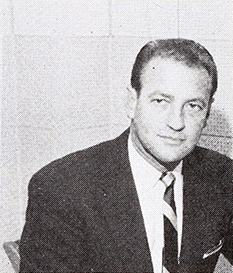10 Apr. 1916–24 Jan. 1978

Jesse Robert (Bob) Poole, broadcaster and humorist, was born in Stoneville, the youngest of seven children of Thomas Phillip and Myrtle Roberts Poole. He often referred to himself as "Mrs. Poole's youngest son," one of the titles he was to assume for life. After graduating as valedictorian of Stoneville High School in 1933, Poole received a scholarship to Guilford College in Greensboro. In 1934, while still in school, he went to work for WBIG radio, then in its rising days under the directorship of Major Edney Ridge. After two years at Guilford, he attended The University of North Carolina, but on weekends he would hitchhike to Greensboro to tape spots and broadcast at the radio station.
Having once considered law school, Poole changed his mind after graduating during the Great Depression. He went to New York City to work in a show called "A Southern Boy and a Southern Girl" for radio station WNEW. As the "southern boy," Poole played alongside Dinah Shore, who was the "southern girl." The station's management felt that Poole's southern accent was a bit too pronounced, however, and dismissed him from the assignment, unwittingly launching him into a new phase of his career.
With World War II in its early stages, Poole went to Kingsport, Tenn., and joined the U.S. Navy, serving for four years. Sent to the Naval Air Station in New Orleans, he began to broadcast a U.S. Navy program called "Sky Wave to Victory" over radio station WWL in New Orleans. After three years of broadcasting with the navy, Poole received a discharge but remained on the station staff as a full-time broadcaster. It was here that "Poole's Paradise" was born. With Robert Taylor as narrator, Poole presented celebrities of the period and was accompanied by then-unknown members of WWL's studio orchestra, including such greats as Al Hirt and Pete Fountain.
Poole's affection for easy rhythm led him to include performances by the New Orleans Symphony on Poole's Paradise. When he discovered that his friend, the symphony's first violinist, was going to a party, Poole decided to crash the affair. The hostess was to become his wife, Gloria. She was the daughter of Harry Rothchild, who operated an antique business in New Orleans, and Mrs. W. F. Hoffecker. The Pooles had three children: Michelle, Randolph, and Kyle.
To oblige his father-in-law, Poole spent a year in the antique business but then returned to radio. He broadcast an early morning talk show over WWL radio and became famous not only in Louisiana but in Canada as well. Induced to move to New York, Poole completed a contract with radio station WOR of New York for an hour-long daily show, beamed by the network coast to coast to 515 radio stations in the country.
Poole became known not only for his trademark corny jokes and cheerful booming baritone voice but also for candid interviews with stars like Bob Hope, Frank Sinatra, Perry Como, Don Knots, and Andy Griffith. Poole was voted "Disc Jockey's Favorite Disc Jockey" in 1949 and 1950. In 1949 American Radio Listeners voted Poole "Radio Mirror's Favorite Disc Jockey Award." Not long afterwards, Poole began to write an article for Macfadden Publications, in New York, which published the piece in Radio and TV Mirror magazine.
Ready to return to North Carolina and to the Piedmont, Poole left New York City in 1952. By then, however, he had already won the coveted "America's Favorite Disc Jockey" award given by John Lester's nationally syndicated radio and TV column.
Returning to station WBIG, Poole established a morning talk show which he began by whistling his theme song, "Paradise." The show, Poole's Paradise, aired for twenty-five years and consistently maintained the highest audience appeal ratings for any age of any show in the area.
The town of Stoneville, Poole's birthplace, awarded him a "Certificate of Meritorious Proclamation" during its Centennial celebration, officially dubbing him the "Duke of Stoneville." The title, which Poole had unofficially assumed many years before, lingered during his broadcast of the first Greater Greensboro Open in North Carolina and still later when he accepted the Heart Fund Appreciation Award for service to the American Heart Association.
As a member of the Greensboro Jaycees, Civitans, and Rotary, Poole was active in the United Fund, Polio, Christmas Seal, and Easter Seal drives. He received "Keys to the City" from Dallas, Tex., Charleston, S.C., and Greensboro. On 25 Sept. 1962 Greensboro citizens turned out by the thousands for "Bob Poole Day." On 4 Jan. 1965 Governor Terry Sanford appointed him ambassador extraordinary in the Order of the Long Leaf Pine.
In 1964 Poole suffered a crushed vertebra in an automobile accident and was hospitalized for a month. His health continued to fail when, in 1973, he had a series of heart attacks and a collapsed lung. The final broadcast of Poole's Paradise took place on the morning of 21 Dec. 1977 at WBIG. His epitaph at Forest Lawn Cemetery in Greensboro closed Poole's life with the same words he used to say good-bye every day of his career, "Take care of you, for me."